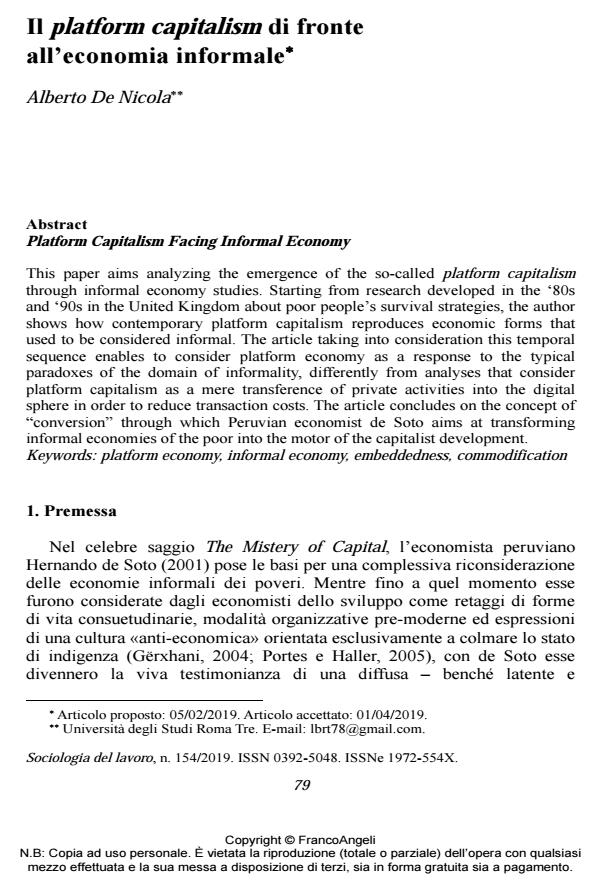Platform Capitalism Facing Informal Economy
Journal title SOCIOLOGIA DEL LAVORO
Author/s Alberto De Nicola
Publishing Year 2019 Issue 2019/154
Language Italian Pages 18 P. 79-96 File size 231 KB
DOI 10.3280/SL2019-154005
DOI is like a bar code for intellectual property: to have more infomation
click here
Below, you can see the article first page
If you want to buy this article in PDF format, you can do it, following the instructions to buy download credits

FrancoAngeli is member of Publishers International Linking Association, Inc (PILA), a not-for-profit association which run the CrossRef service enabling links to and from online scholarly content.
This paper aims analyzing the emergence of the so-called platform capitalism through informal economy studies. Starting from research developed in the ‘80s and ‘90s in the United Kingdom about poor people’s survival strategies, the author shows how contemporary platform capitalism reproduces economic forms that used to be considered informal. The article taking into consideration this temporal sequence enables to consider platform economy as a response to the typical paradoxes of the domain of informality, differently from analyses that consider platform capitalism as a mere transference of private activities into the digital sphere in order to reduce transaction costs. The article concludes on the concept of "conversion" through which Peruvian economist de Soto aims at transforming informal economies of the poor into the motor of the capitalist development.
Il contributo si propone di indagare l’emergere di alcune forme del cosiddetto platform capitalism alla luce degli studi sull’economia informale. Partendo dalle ricerche che si sono svolte tra gli anni Ottanta e i Duemila nel Regno Unito sulle strategie di sopravvivenza dei poveri, si mostrerà come alcune più recenti attività dell’economia di piattaforma replichino forme economiche precedentemente collocate nel campo dell’informalità. Differentemente dalle analisi che hanno visto l’affermazione del capitalismo delle piattaforme come il mero trasferimento di attività private nella dimensione digitale e rispondente al solo motivo della riduzione dei costi di transazione, questa sequenza temporale consentirà di interpretare le economie di piattaforma come una risposta ai paradossi tipici del dominio dell’informalità. Il contributo terminerà con la discussione della nozione di "conversione" con la quale l’economista peruviano de Soto indicava l’obiettivo di trasformare le economie informali dei poveri in motori dello sviluppo capitalistico.
Keywords: Platform economy, informal economy, embeddedness, commodification
Alberto De Nicola, Il platform capitalism di fronte all’economia informale in "SOCIOLOGIA DEL LAVORO " 154/2019, pp 79-96, DOI: 10.3280/SL2019-154005